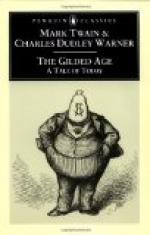This was the material view, and the least important in the honorable gentleman’s opinion. [Here he referred to some notes furnished him by Senator Dilworthy, and then continued.] God had given us the care of these colored millions. What account should we render to Him of our stewardship? We had made them free. Should we leave them ignorant? We had cast them upon their own resources. Should we leave them without tools? We could not tell what the intentions of Providence are in regard to these peculiar people, but our duty was plain. The Knobs Industrial University would be a vast school of modern science and practice, worthy of a great nation. It would combine the advantages of Zurich, Freiburg, Creuzot and the Sheffield Scientific. Providence had apparently reserved and set apart the Knobs of East Tennessee for this purpose. What else were they for? Was it not wonderful that for more than thirty years, over a generation, the choicest portion of them had remained in one family, untouched, as if, separated for some great use!
It might be asked why the government should buy this land, when it had millions of yes, more than the railroad companies desired, which, it might devote to this purpose? He answered, that the government had no such tract of land as this. It had nothing comparable to it for the purposes of the University: This was to be a school of mining, of engineering, of the working of metals, of chemistry, zoology, botany, manufactures, agriculture, in short of all the complicated industries that make a state great. There was no place for the location of such a school like the Knobs of East Tennessee. The hills abounded in metals of all sorts, iron in all its combinations, copper, bismuth, gold and silver in small quantities, platinum he—believed, tin, aluminium; it was covered with forests and strange plants; in the woods were found the coon, the opossum, the fox, the deer and many other animals who roamed in the domain of natural history; coal existed in enormous quantity and no doubt oil; it was such a place for the practice of agricultural experiments that any student who had been successful there would have an easy task in any other portion of the country.
No place offered equal facilities for experiments in mining, metallurgy, engineering. He expected to live to see the day, when the youth of the south would resort to its mines, its workshops, its laboratories, its furnaces and factories for practical instruction in all the great industrial pursuits.
A noisy and rather ill-natured debate followed, now, and lasted hour after hour. The friends of the bill were instructed by the leaders to make no effort to check it; it was deemed better strategy to tire out the opposition; it was decided to vote down every proposition to adjourn, and so continue the sitting into the night; opponents might desert, then, one by one and weaken their party, for they had no personal stake in the bill.




